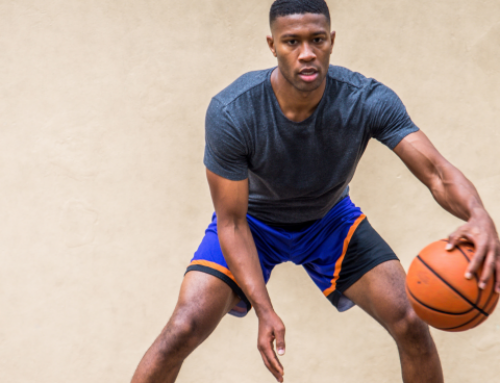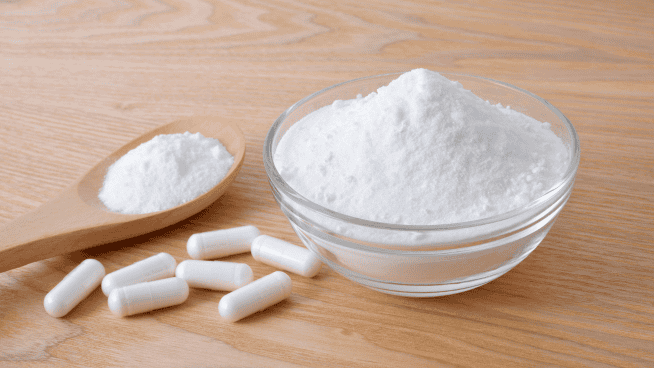The NBA’s Vegan Revolution: Why so Many Players Embrace a Plant-Based Diet
Once upon a time, the idea of veganism catching on among the NBA elite would’ve seemed all but impossible.
Call it a generational disconnect. Charles Barkley, one of the game’s transcendent superstars in the 1990s, recently said “there’s no such thing as a vegetarian.” Not every star of that era is so nutritionally close-minded, but we’re guessing there wasn’t much kale or quinoa inside those locker rooms. Fast forward to modern day, and any stigma once associated with pro athletes and plant-based diets has largely vanished. Kip Anderson, director of the documentary What The Health, joked to B/R Mag that the NBA will soon be known as the NVA—the National Vegan Association.
Indeed, many of the league’s top players have embraced vegan or vegetarian-style eating. As a refresher, a vegan diet excludes all animal products—so not just “no meat,” but no animal’s milk, cheese, butter, etc. A vegetarian diet excludes meat but allows for animal products. While not every player referenced in this piece strictly follows those labels, their diet is much more in line with that of a vegan or vegetarian than it is with the Standard American Diet.
RELATED: How Carl Lewis Shattered World Records on a Vegan Diet
Marc Gasol was at the forefront of the league’s fascination with plant-based eating. Prior to the 2014 season, the All-Star center embraced a “flexitarian” diet which saw him consume most of his calories in the form of fruits, veggies, nuts and legumes. After a close friend introduced Gasol to how versatile and tasty vegetarian dishes can be, the Spaniard said he felt more energetic and durable when he upped his intake of plant-based foods. “I found out how surprisingly tasty [vegetarian meals] can be,” Gasol told STACK. “And when you know it’s good for you, it becomes even tastier.” A slimmed down Gasol saw immediate results that season, averaging what was then a new career-high in points per game. He now says vegetables make up 60 percent of his diet.
Denver Nuggets forward Wilson Chandler was one of the first active NBA players to adopt a vegan diet. After suffering multiple season-ending injuries, Chandler wanted a diet that would both increase his energy and help him stay on the court. In Spring of 2016, he came to the conclusion a vegan diet might be exactly what he needed. When he first started the diet, Chandler felt sluggish and out of sorts. That’s because he wasn’t eating enough protein—a common problem for athletes who embrace vegan diets, but one that can be solved. “I was winging it. I just jumped in. But as I learned more and figured out which foods had more protein, I was fine. But at first it was hard to keep my stamina up and I would get tired faster, but now I’m more knowledgeable,” Chandler told GQ. Once he optimized his diet, Chandler saw big improvements in his recovery, energy and mood, which allowed him to enter games and practices feeling more refreshed. His play from last season reflected that. Chandler appeared in 71 games while posting new career-highs in points per game (15.7) and rebounds per game (6.5).
Perhaps in part thanks to Chandler’s strong, vegan-fueled season, the summer of 2017 signaled a meatless movement around the NBA. This offseason, players like Jahlil Okafor, Damian Lillard, Al Jefferson and Kyrie Irving all adopted vegan or vegetarian-style diets.
Okafor, a 21-year-old center for the Philadelphia 76ers, has been plagued by injuries since he entered the league in 2015. However, he’s flashed signs of dominance when healthy, averaging 14.6 points and 5.9 rebounds per game over his first 105 appearances. In an effort to cut down on injuries (particularly those related to his achy knees), Okafor embraced a vegan diet this offseason. The change helped him lose roughly 20 pounds. “(I used to eat) a bunch of BS, man, but I cut it out and am glad I did it,” Okafor said during a Sixers media event. “It took some drastic changes to get to this point, and I’m feeling really good.” Okafor first cut out dairy before gradually making his way to a vegan diet. While there’s a logjam for playing time on the 76ers roster, numerous teams have inquired about trading for Okafor. If his vegan diet can better help him stay on the court, they might get a steal.
RELATED: How a Vegan Diet May Have Healed Jahlil Okafor’s Ailing Knees
Lillard is one of the most durable and consistent players in the NBA. After winning Rookie of the Year in 2013, he’s either been an All-Star or a member of the All-NBA team in each of the past three seasons. He’s also never appeared in fewer than 75 games in a season. So why did Dame recently elect to adopt a vegan diet? He explains the decision in this Oregon Live video:[youtube video=”aLZ-qndfGWA”]
“I wanted to play lighter this year, be easier on my joints and on my feet. Getting older, you don’t want that age to sneak up on you where you get in the habit of eating whatever you want to eat because you know (you’re) gonna burn it off when you play. So just creating better habits,” the 27-year-old Portland Trailblazers point guard said. “I can feel it. I can definitely feel it.”
The diet appears to be working wonders for Lillard, who’s down roughly 10 pounds from what his playing weight was last season. He’s currently averaging what would be new career-highs in free-throw percentage, rebounds, offensive rebounds, steals, blocks and assists.
Jefferson, a center for the Indiana Pacers, was dissatisfied with his play last season. That, along with the fact he’ll be turning 33 this season, spurred him to go vegetarian this offseason. He’s since lost 20 pounds. “If I had been satisfied with last season, it shows the type of person I am. I know I’m not that type of person. I didn’t think I came in ready. I didn’t think I was motivated. Whatever the reason is, it got me to where I am now. In a way, I’m glad it happened,” Jefferson told IndyStar.com prior to the season. “I’m a vegetarian now.”
Though Jefferson has made no promises the diet will last forever, he’s playing better this season. He’s still working to earn more consistent minutes, but he’s been quite effective in limited time. His per-48-minutes production in points, rebounds and blocks rank among the best in the NBA.
New York Knicks center Enes Kanter is another player who lost a massive amount of weight this offseason by switching up his diet, as he reportedly dropped 51 pounds by eating primarily salads and seafood (though the latter of which is not vegan nor vegetarian, of course). He’s off to a blazing start, averaging 14.1 points and 11 rebounds per game on 63.6% shooting from the field.
Then there’s Irving, the enigmatic All-Star point guard of the Boston Celtics. “This season I’ve been on more of a plant-based diet, getting away from all the animals and all that. I had to get away from that,” Irving told NBA Countdown after a preseason game. “My energy is up and my body feels amazing. Just understanding what the (best) diet is like for me and what’s beneficial for me for having the most energy out here and being able to sustain it at a very high level.” Sustained energy. That’s been key for Irving this season, as he’s scored the second-most clutch points (defined as points which come when a game’s within five points with less than five minutes remaining) in the league so far this season. He has also recorded seven assists and zero turnovers during those clutch situations. It’s no wonder the Celtics currently have the best record in the NBA. “It works,” Irving told B/R Mag of his new diet.
There seem to be two prevailing reasons for why so many NBA players are embracing these diets. One is to reduce their risk of injury and become more durable. Two is to drop weight and get leaner. But is there any science that proves a vegan or vegetarian-style diet is particularly helpful for these goals?
A 2015 study published in the journal Complementary Therapies in Medicine centered around 600 participants adopting a vegan diet “rich in fresh fruits and vegetables, whole grains and various legumes, nuts and seeds” for a three-week period. Researchers found most participants had significantly lowered their levels of C-reactive protein, a key biomarker for acute and chronic inflammation, by the end of the study. A recent meta-analysis published in the journal Public Health Nutrition concluded that a “vegetarian diet might be a useful approach to manage (chronic inflammation) in the long term.” So there are certainly signs that more of a plant-based diet could be helpful from an inflammation standpoint.
Several studies have found vegetarian and vegan diets to be extraordinarily effective for weight loss. A 2017 study published in the Journal of the American College of Nutrition found that a vegetarian diet (which limited animal products to one portion of low-fat yogurt a day) helped participants lose nearly twice as much weight as a conventional anti-diabetic diet. The vegetarian diet also produced significantly more intramuscular fat loss. According to Science Daily, reducing intramuscular fat “could help improve muscular strength and mobility.” And it doesn’t seem that one must necessarily impose a calorie restriction to see weight loss from a plant-based diet. A 2013 study found that participants who consumed a vegan or vegetarian diet without calorie restrictions lost an average of 8.2 to 9.9 pounds over eight weeks. Plant-based foods are high in fiber yet low in calories, which is a perfect combination for helping someone feel full without overeating.
But it’s not just the simple increase in plant-based foods that’s helping players gain vitality and drop weight. It’s also what those foods are replacing. Okafor used to gorge on McDonald’s Sausage McGriddles. Jefferson loved fried chicken. Chandler constantly craved greasy ground beef tacos. The simple act of removing these type of foods from their diet would’ve likely been enough for them to feel a difference. This phenomenon is known as “dietary displacement,” and it’s the same reason why many people feel better on a gluten-free diet even if they aren’t actually sensitive to gluten. Having said that, the fact these players are replacing junk food with wholesome vegan or vegetarian-friendly options is certainly making the benefits of their diet more powerful.
RELATED: Why Are People Avoiding Gluten?
Don’t expect this trend to fade anytime soon. As more players continue to adopt these type of diets, the more teams will cater to their needs. And it does appear that there will be more players to follow in the footsteps of Irving and Lillard. Jaylen Brown, the 21-year-old Boston Celtics shooting guard who already lays off red meat and pork, has said he plans on going vegan by his 25th birthday. Michael and Jontay Porter Jr., two brothers who currently star for the University of Missouri’s basketball team, have already transitioned to a mostly “raw vegan” diet. Then there’s the growing trend of leaner NBA players—the average NBA player now weighs three pounds less than they did four years ago, despite remaining the same height. Lighter players are better suited to keep up with the uptempo, position-less brand of basketball the NBA is gravitating towards. As we’ve already established, a vegan or vegetarian diet can be a direct route to weight loss for many athletes.
It’s important to know that vegan and vegetarian diets aren’t without their own unique hazards. These players have private chefs and teams of nutritionists to work alongside them—your average athlete does not. If you’re interested in embracing a vegan or vegetarian diet, here’s what you need to know.
Photo Credit: Cameron Browne/Getty, Joe Murphy/Getty, nathanaparise/iStock
READ MORE:
RECOMMENDED FOR YOU
MOST POPULAR
The NBA’s Vegan Revolution: Why so Many Players Embrace a Plant-Based Diet
Once upon a time, the idea of veganism catching on among the NBA elite would’ve seemed all but impossible.
Call it a generational disconnect. Charles Barkley, one of the game’s transcendent superstars in the 1990s, recently said “there’s no such thing as a vegetarian.” Not every star of that era is so nutritionally close-minded, but we’re guessing there wasn’t much kale or quinoa inside those locker rooms. Fast forward to modern day, and any stigma once associated with pro athletes and plant-based diets has largely vanished. Kip Anderson, director of the documentary What The Health, joked to B/R Mag that the NBA will soon be known as the NVA—the National Vegan Association.
Indeed, many of the league’s top players have embraced vegan or vegetarian-style eating. As a refresher, a vegan diet excludes all animal products—so not just “no meat,” but no animal’s milk, cheese, butter, etc. A vegetarian diet excludes meat but allows for animal products. While not every player referenced in this piece strictly follows those labels, their diet is much more in line with that of a vegan or vegetarian than it is with the Standard American Diet.
RELATED: How Carl Lewis Shattered World Records on a Vegan Diet
Marc Gasol was at the forefront of the league’s fascination with plant-based eating. Prior to the 2014 season, the All-Star center embraced a “flexitarian” diet which saw him consume most of his calories in the form of fruits, veggies, nuts and legumes. After a close friend introduced Gasol to how versatile and tasty vegetarian dishes can be, the Spaniard said he felt more energetic and durable when he upped his intake of plant-based foods. “I found out how surprisingly tasty [vegetarian meals] can be,” Gasol told STACK. “And when you know it’s good for you, it becomes even tastier.” A slimmed down Gasol saw immediate results that season, averaging what was then a new career-high in points per game. He now says vegetables make up 60 percent of his diet.
Denver Nuggets forward Wilson Chandler was one of the first active NBA players to adopt a vegan diet. After suffering multiple season-ending injuries, Chandler wanted a diet that would both increase his energy and help him stay on the court. In Spring of 2016, he came to the conclusion a vegan diet might be exactly what he needed. When he first started the diet, Chandler felt sluggish and out of sorts. That’s because he wasn’t eating enough protein—a common problem for athletes who embrace vegan diets, but one that can be solved. “I was winging it. I just jumped in. But as I learned more and figured out which foods had more protein, I was fine. But at first it was hard to keep my stamina up and I would get tired faster, but now I’m more knowledgeable,” Chandler told GQ. Once he optimized his diet, Chandler saw big improvements in his recovery, energy and mood, which allowed him to enter games and practices feeling more refreshed. His play from last season reflected that. Chandler appeared in 71 games while posting new career-highs in points per game (15.7) and rebounds per game (6.5).
Perhaps in part thanks to Chandler’s strong, vegan-fueled season, the summer of 2017 signaled a meatless movement around the NBA. This offseason, players like Jahlil Okafor, Damian Lillard, Al Jefferson and Kyrie Irving all adopted vegan or vegetarian-style diets.
Okafor, a 21-year-old center for the Philadelphia 76ers, has been plagued by injuries since he entered the league in 2015. However, he’s flashed signs of dominance when healthy, averaging 14.6 points and 5.9 rebounds per game over his first 105 appearances. In an effort to cut down on injuries (particularly those related to his achy knees), Okafor embraced a vegan diet this offseason. The change helped him lose roughly 20 pounds. “(I used to eat) a bunch of BS, man, but I cut it out and am glad I did it,” Okafor said during a Sixers media event. “It took some drastic changes to get to this point, and I’m feeling really good.” Okafor first cut out dairy before gradually making his way to a vegan diet. While there’s a logjam for playing time on the 76ers roster, numerous teams have inquired about trading for Okafor. If his vegan diet can better help him stay on the court, they might get a steal.
RELATED: How a Vegan Diet May Have Healed Jahlil Okafor’s Ailing Knees
Lillard is one of the most durable and consistent players in the NBA. After winning Rookie of the Year in 2013, he’s either been an All-Star or a member of the All-NBA team in each of the past three seasons. He’s also never appeared in fewer than 75 games in a season. So why did Dame recently elect to adopt a vegan diet? He explains the decision in this Oregon Live video:[youtube video=”aLZ-qndfGWA”]
“I wanted to play lighter this year, be easier on my joints and on my feet. Getting older, you don’t want that age to sneak up on you where you get in the habit of eating whatever you want to eat because you know (you’re) gonna burn it off when you play. So just creating better habits,” the 27-year-old Portland Trailblazers point guard said. “I can feel it. I can definitely feel it.”
The diet appears to be working wonders for Lillard, who’s down roughly 10 pounds from what his playing weight was last season. He’s currently averaging what would be new career-highs in free-throw percentage, rebounds, offensive rebounds, steals, blocks and assists.
Jefferson, a center for the Indiana Pacers, was dissatisfied with his play last season. That, along with the fact he’ll be turning 33 this season, spurred him to go vegetarian this offseason. He’s since lost 20 pounds. “If I had been satisfied with last season, it shows the type of person I am. I know I’m not that type of person. I didn’t think I came in ready. I didn’t think I was motivated. Whatever the reason is, it got me to where I am now. In a way, I’m glad it happened,” Jefferson told IndyStar.com prior to the season. “I’m a vegetarian now.”
Though Jefferson has made no promises the diet will last forever, he’s playing better this season. He’s still working to earn more consistent minutes, but he’s been quite effective in limited time. His per-48-minutes production in points, rebounds and blocks rank among the best in the NBA.
New York Knicks center Enes Kanter is another player who lost a massive amount of weight this offseason by switching up his diet, as he reportedly dropped 51 pounds by eating primarily salads and seafood (though the latter of which is not vegan nor vegetarian, of course). He’s off to a blazing start, averaging 14.1 points and 11 rebounds per game on 63.6% shooting from the field.
Then there’s Irving, the enigmatic All-Star point guard of the Boston Celtics. “This season I’ve been on more of a plant-based diet, getting away from all the animals and all that. I had to get away from that,” Irving told NBA Countdown after a preseason game. “My energy is up and my body feels amazing. Just understanding what the (best) diet is like for me and what’s beneficial for me for having the most energy out here and being able to sustain it at a very high level.” Sustained energy. That’s been key for Irving this season, as he’s scored the second-most clutch points (defined as points which come when a game’s within five points with less than five minutes remaining) in the league so far this season. He has also recorded seven assists and zero turnovers during those clutch situations. It’s no wonder the Celtics currently have the best record in the NBA. “It works,” Irving told B/R Mag of his new diet.
There seem to be two prevailing reasons for why so many NBA players are embracing these diets. One is to reduce their risk of injury and become more durable. Two is to drop weight and get leaner. But is there any science that proves a vegan or vegetarian-style diet is particularly helpful for these goals?
A 2015 study published in the journal Complementary Therapies in Medicine centered around 600 participants adopting a vegan diet “rich in fresh fruits and vegetables, whole grains and various legumes, nuts and seeds” for a three-week period. Researchers found most participants had significantly lowered their levels of C-reactive protein, a key biomarker for acute and chronic inflammation, by the end of the study. A recent meta-analysis published in the journal Public Health Nutrition concluded that a “vegetarian diet might be a useful approach to manage (chronic inflammation) in the long term.” So there are certainly signs that more of a plant-based diet could be helpful from an inflammation standpoint.
Several studies have found vegetarian and vegan diets to be extraordinarily effective for weight loss. A 2017 study published in the Journal of the American College of Nutrition found that a vegetarian diet (which limited animal products to one portion of low-fat yogurt a day) helped participants lose nearly twice as much weight as a conventional anti-diabetic diet. The vegetarian diet also produced significantly more intramuscular fat loss. According to Science Daily, reducing intramuscular fat “could help improve muscular strength and mobility.” And it doesn’t seem that one must necessarily impose a calorie restriction to see weight loss from a plant-based diet. A 2013 study found that participants who consumed a vegan or vegetarian diet without calorie restrictions lost an average of 8.2 to 9.9 pounds over eight weeks. Plant-based foods are high in fiber yet low in calories, which is a perfect combination for helping someone feel full without overeating.
But it’s not just the simple increase in plant-based foods that’s helping players gain vitality and drop weight. It’s also what those foods are replacing. Okafor used to gorge on McDonald’s Sausage McGriddles. Jefferson loved fried chicken. Chandler constantly craved greasy ground beef tacos. The simple act of removing these type of foods from their diet would’ve likely been enough for them to feel a difference. This phenomenon is known as “dietary displacement,” and it’s the same reason why many people feel better on a gluten-free diet even if they aren’t actually sensitive to gluten. Having said that, the fact these players are replacing junk food with wholesome vegan or vegetarian-friendly options is certainly making the benefits of their diet more powerful.
RELATED: Why Are People Avoiding Gluten?
Don’t expect this trend to fade anytime soon. As more players continue to adopt these type of diets, the more teams will cater to their needs. And it does appear that there will be more players to follow in the footsteps of Irving and Lillard. Jaylen Brown, the 21-year-old Boston Celtics shooting guard who already lays off red meat and pork, has said he plans on going vegan by his 25th birthday. Michael and Jontay Porter Jr., two brothers who currently star for the University of Missouri’s basketball team, have already transitioned to a mostly “raw vegan” diet. Then there’s the growing trend of leaner NBA players—the average NBA player now weighs three pounds less than they did four years ago, despite remaining the same height. Lighter players are better suited to keep up with the uptempo, position-less brand of basketball the NBA is gravitating towards. As we’ve already established, a vegan or vegetarian diet can be a direct route to weight loss for many athletes.
It’s important to know that vegan and vegetarian diets aren’t without their own unique hazards. These players have private chefs and teams of nutritionists to work alongside them—your average athlete does not. If you’re interested in embracing a vegan or vegetarian diet, here’s what you need to know.
Photo Credit: Cameron Browne/Getty, Joe Murphy/Getty, nathanaparise/iStock
READ MORE:












